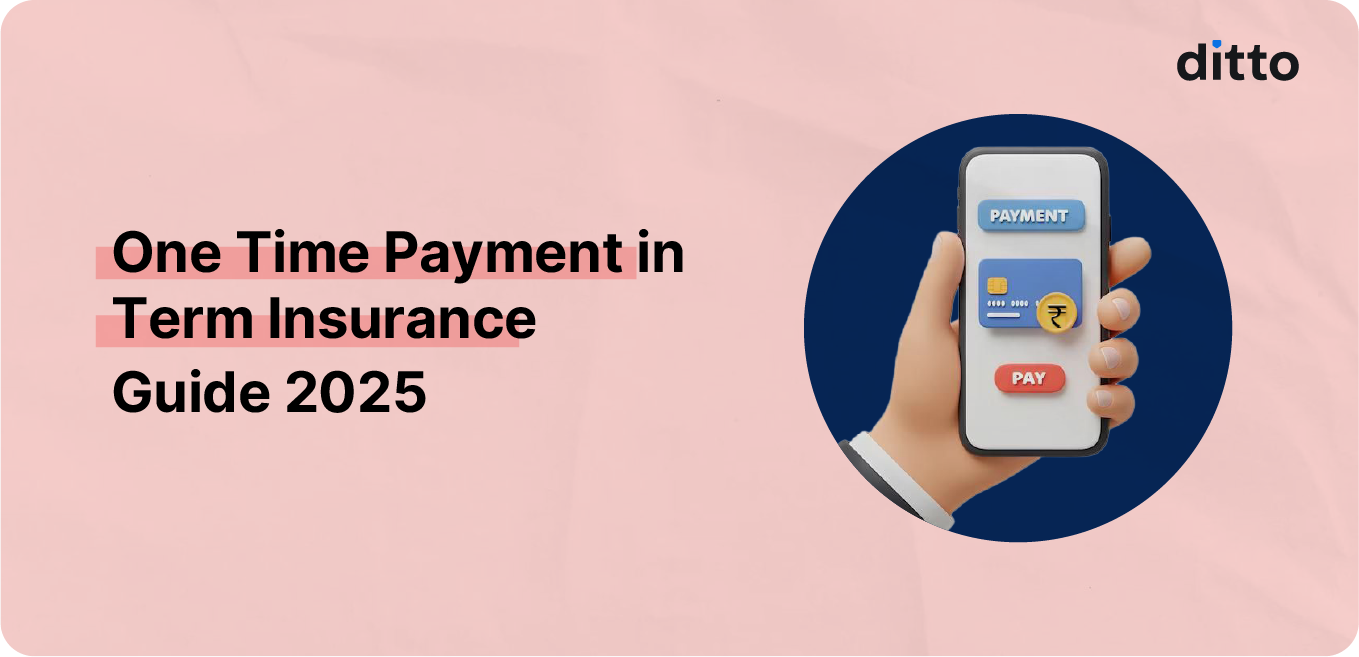What Is One Time Payment/Single Premium Term Insurance?
As per IRDAI rules, you can choose how you want to pay your insurance premium. In a single premium term plan, you pay the entire amount upfront when buying the policy.
Unlike regular term plans, there are no yearly, quarterly, or monthly payments. One lump-sum payment keeps your policy active and provides coverage for the full duration of the plan.
Introduction
Confused about whether to pay your term insurance once or every year? A single premium plan may look simple since you pay only once and stay covered. But it may not suit everyone’s needs.
This guide helps you understand:
- How does a single premium term plan work
- Benefits and differences from other premium payment modes
- Is a single-premium term plan worth your money
Still unsure about purchasing a term plan? Book a free call with us, and let our experts guide you through the process.
How Does One Time Payment Term Insurance Work?
You pay the premium once, and the amount depends on your age, sum assured, health history, and policy duration. After payment, your policy stays active for the full term. Yes, it’s that simple, and there are no recurring premiums.
In most term plans, there is no payout if you survive the policy period. However, if you pass away during the term, your family gets the sum assured.
Let’s take a quick look at the top insurers offering single premium term plans:
Before we discuss the list, here’s how we decide what plans to feature.
At Ditto, every term plan goes through our six-point evaluation framework. It doesn’t mean these are the only good plans, but that they stand out after being scored across all six pillars.
You can learn more about how we evaluate term insurance plans here.

Benefits of One Time Payment Term Insurance
No Recurring Payments
You pay only once at the start. There’s no need to track monthly or yearly premiums, reducing the chance of policy lapses or missed payments.
Easy Financial Management
It’s ideal for those who prefer simple money management or have variable incomes. You can use one-time earnings like bonuses or inheritances to secure lifelong protection.
Tax Benefits
You can claim tax deductions under Section 80C in the year of payment and enjoy tax-free maturity or death benefits under Section 10(10D).
Peace of Mind
Once paid, your policy stays active without yearly renewals. It offers lasting financial security and emotional comfort for you and your family.
Point To Be Noted:
IRDAI requires single-premium life plans to offer a partial refund if surrendered. However, you get back only a part of the premium. Also, to keep maturity benefits tax-free, your premium must stay below 10% of the sum assured. Death benefits always remain tax-free. Learn more about such regulations.
How does a Single Premium Term Plan Vary with Age?
Let’s examine how the premium varies for an HDFC term plan with a coverage of ₹1 crore. For non-smokers, the coverage is up to age 70.
What Is the Difference Between Annual Premium Payments and One Time Payment?
When you buy term insurance, your premium payment options can vary. Take a look at the different payment modes:
Ditto’s Take on Single Premium Term Insurance
At Ditto, we recommend regular or limited pay term insurance for most people. That’s because insurance is meant to protect your family instead of being an investment. Single premium plans work only for those who want to avoid renewal hassles and have extra cash lying idle. While paying once may seem cheaper, the opportunity cost is high.
Moreover, policy benefits are often reduced in single-pay options. For example, Axis Max Life doesn’t allow a critical illness rider for single-pay plans. Similarly, ICICI Prudential limits the policy term to 20 years if you choose a single premium.
Why Talk to Ditto for Your Term Insurance?
At Ditto, we’ve assisted over 8,00,000 customers with choosing the right insurance policy. Why customers like Ankit below love us:

- No Spam & No Salesmen
- Rated 4.9/5 on Google Reviews by 15,000+ happy customers
- Backed by Zerodha
- 100% Free Consultation
You can book a FREE consultation. Slots are running out, so make sure you book a free call now!
Final Thoughts
Regular payments keep the plan affordable and better aligned with your income flow. This is the most flexible payment option and is tax-efficient for salaried individuals. Single payments, on the other hand, may not provide you with the same amount of flexibility for premium payments.
FAQs
What types of deaths are covered in single premium term insurance plans?
Most plans cover natural and accidental deaths. Deaths due to suicide within the first year or unlawful acts are usually excluded.
Can I surrender or terminate a single-premium term plan?
Yes, you can cancel the policy within the free-look period (usually 15–30 days). After that, surrender options depend on the plan type and insurer rules.
Is single-premium term insurance refundable?
Pure term plans don’t offer any refund. However, return-of-premium variants may refund part or all of the premium after policy expiry.
Are single-premium plans cheaper than regular ones?
In total, they may seem higher, but when discounted for future value, they can work out slightly cheaper overall, depending on age and coverage.
Are riders available with a single premium payment option in term insurance?
Term insurance riders like critical illness benefits with single pay premiums are often not available.
Last updated on:










